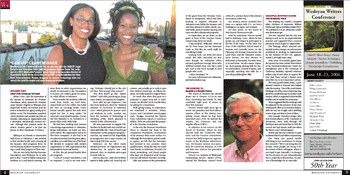Student View
[Editor’s Note: After the devastation of the tsunami in Indonesia, the Freeman Foundation, which sponsors the Freeman Asian Scholars Program at Wesleyan, challenged both students and alumni from the area to recommend an agency worthy of $1 million in aid. The Foundation considered several proposals and accepted one from an alumnus advocating an organization with a diversified, educationally oriented mission. Although their proposal wasn’t the winner, students gained a lot from the process, as Eliza Handayani ’05 relates.]
 Talking to my friends in universities back home in Indonesia, I was stunned to find out that faculty were running all the tsunami relief programs there. In one university, students resorted to starting a small relief program of their own.
Talking to my friends in universities back home in Indonesia, I was stunned to find out that faculty were running all the tsunami relief programs there. In one university, students resorted to starting a small relief program of their own.
“We are very lucky that the Freeman Foundation and Wesleyan let us take part in this,” I said to fellow Indonesian students in a mid-March meeting. We were there to select organizations we would recommend to the Foundation to receive a $1 million grant for tsunami relief efforts in Indonesia.
From outside, the windows reflected snow; from inside, our tired faces. Aussie held on to his coffee; Tia rested her chin on sociology books; Umay leaned casually against the wall; Mira wiped her face to keep awake. Yet everyone’s eyes showed sparks?for we did feel thankful to be included in a project that could really help.
We had been working since January researching organizations in Indonesia. Being Indonesians, we knew our foremost criteria: the organization had to be free from corruption. It also had to be non-discriminatory, have long-term plans, and allow us to audit their use of the fund. We decided to cooperate with student organizations or with organizations that had people we knew and trusted.
At first, the job proved harder than we imagined.
“I sent 20 e-mails and letters?and no response,” I said in our next meeting. “Perhaps I should put in the subject line: ?Free money! Free money!’”
“But then they’ll go like, ?Spam! Delete!’” said Aldo, punching an imaginary button, prompting our laughter.
Soon after we got responses. One was from Medicare, short for “Medical students of University of Indonesia Care,” which planned to sponsor medical students in Aceh. Another was from the Institute of Technology of Bandung (ITB), which planned to rebuild Aceh’s infrastructure.
We were passionate to support ITB, but then its faculty took over and left students with little role. “Now it’s hard to get information on the program’s progress,” said Ifan, my contact at ITB. Regretfully, as transparency was a main concern, we had to drop ITB from our list.
Medicare, on the other hand, showed promise. Its organization was student-run; its project was well planned. Also, its students were eager to work with us.
Like us, they, too, stole time between exams to help: gather aid, round up volunteers, and actually go to Aceh to give free medical check-ups. As fellow students, we really wanted to support them.
So much that when they gave us a proposal 31 pages long and in Indonesian, we decided not to trouble them by asking for a translation.
With gotong royong, or cooperation, we translated it ourselves. Selina, Aussie, and I translated several pages each. Rangga converted the figures from Indonesian rupiah to American dollars. Then we submitted the proposal to the Freeman Foundation.
In the end, the Freeman Foundation chose to channel the fund to the Sampoerna Foundation, recommended by alumnus Felix Aristo Ardian ’03. Although the Foundation picked another agency, we felt that the Freemans had listened to our concerns about qualifications. Along the way, we made new friends in Indonesia, learned a lot about networking, and found people who have not despaired amid corruption but still believe that they can help.
Aldo was present at the presentationof the grant from the Freeman Foundation to Sampoerna, which had been working to improve education in Indonesia since before the tsunami, and now they planned to build schools, provide books, sponsor teacher training, and carry out other educational programs.
In September, we sat down on the grass in front of the Campus Center, reminiscing about our work.
“I was touched,” Bella said. “Here we are far from home, yet the Freemans made us feel like we could really do something to help.”
Looking back, our work did seem small. But Aldo reminded me that even though no individual effort seemed significant enough, those who suffered needed every care they could get. And it was hard enough to find people who cared.
?Eliza Handayni ’05
For more information see: www.sampoernafoundation.org/
